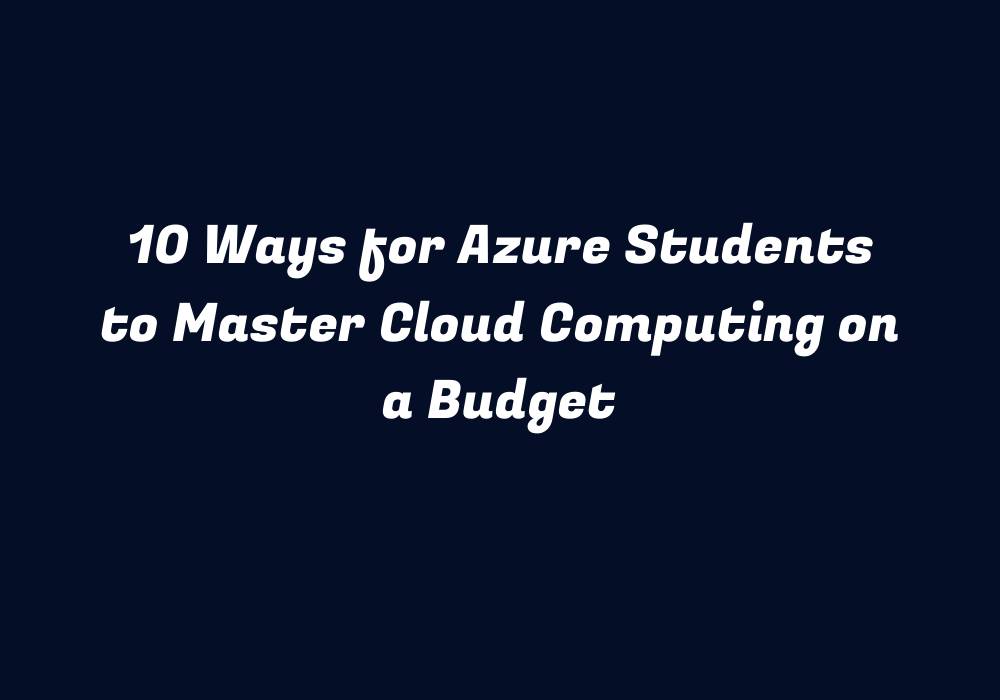Introduction
Mastering cloud computing can be a game-changer for students, enabling them to explore the vast potential of Azure. The Azure platform offers various services that allow users to develop, manage, and deploy applications on demand. This comprehensive guide outlines 10 ways for Azure students to maximize their learning experience without breaking the bank.
1. Utilizing Free Trial Accounts
One of the best methods to learn cloud computing on a budget is taking advantage of free trial accounts offered by various cloud service providers, such as Microsoft Azure. The Microsoft Azure Free Account provides $200 in free credit for 30 days, which can cover numerous services and experiments. This option offers an opportunity to get hands-on experience without committing to long-term contracts or spending money.
2. Embracing Azure’s Open Source Community
Azure has a vibrant open source community that contributes to the development of various projects. The community offers vast resources for students to learn cloud computing through free tools, tutorials, and documentation. Participating in these initiatives can help students gain valuable insights into Azure services, as well as broaden their perspectives on cloud computing as a whole.
3. Exploring Microsoft Learn Platform
Microsoft provides the Learn platform to help users build skills and knowledge on various technologies, including Azure cloud computing. The platform offers free learning paths and training modules that cover fundamental concepts and real-world scenarios. By working through these courses, students can hone their skills and apply their newfound understanding to practical projects.
4. Leveraging Virtual Labs for Hands-On Experience
Virtual labs are an excellent way to gain hands-on experience with Azure services without needing physical hardware or infrastructure. A variety of free virtual labs, such as the ones available on Microsoft Virtual Academy and Microsoft Learn, provide students with step-by-step guides on various topics in cloud computing. These resources allow users to experiment with different features and configurations, ultimately enhancing their understanding of Azure’s capabilities.
5. Participating in Hackathons and Coding Competitions
Participation in hackathons and coding competitions provides a fantastic opportunity for students to demonstrate their skills, network, and gain valuable feedback from industry professionals. These events often include challenges that involve developing solutions on Azure, allowing participants to explore the platform’s offerings while working with peers. Winning or placing high can lead to awards, scholarships, and other opportunities that support further learning.
6. Joining Cloud Computing Groups on Social Media
Social media platforms like LinkedIn, Facebook, and Twitter are excellent resources for staying updated on the latest trends in cloud computing. By joining relevant groups and following influential figures in the industry, students can access a wealth of information, including tutorials, blog posts, and discussions about Azure services. Engaging with these communities will help them stay informed and contribute to their growth as learners.
7. Attending Cloud Computing Conferences and Events
Attending local or virtual conferences and events related to cloud computing is another way for students to network with professionals while broadening their knowledge of Azure and other cloud platforms. These events often feature keynote speakers, panel discussions, workshops, and hands-on training sessions. By participating in such activities, students can gain insights into the latest innovations and best practices in the industry.
8. Engaging in Cloud Computing Forums and Discussions
Forum discussions and online Q&A platforms like Stack Overflow are great resources for students looking to learn cloud computing on a budget. These platforms provide an opportunity for users to ask questions, receive answers from experienced professionals, and share their knowledge with others. Students can benefit from the collective wisdom of the community, as well as contribute by helping others in their journey towards mastering Azure’s capabilities.
9. Exploring Free Online Resources and Tutorials
There is no shortage of high-quality, free online resources available to students interested in learning cloud computing on a budget. Platforms like YouTube, Udemy, and Codecademy offer an extensive collection of video tutorials, courses, and interactive lessons that cover various aspects of Azure’s services and applications. By exploring these materials, students can expand their knowledge at their own pace without spending money.
10. Collaborating with Peers for Practical Projects
Collaboration with peers is essential for mastering any field, including cloud computing. Working together on practical projects will not only help students strengthen their skills but also foster a sense of teamwork and problem-solving. By leveraging Azure services to solve real-world problems in groups, they can create valuable experiences that will translate well into future careers or endeavors.
Conclusion
Learning cloud computing on a budget is not impossible for students with determination and the right resources at their disposal. With an array of free trials, open source communities, online platforms, and educational opportunities, Azure students can maximize their learning experience and develop essential skills for future success in the field of cloud computing.
